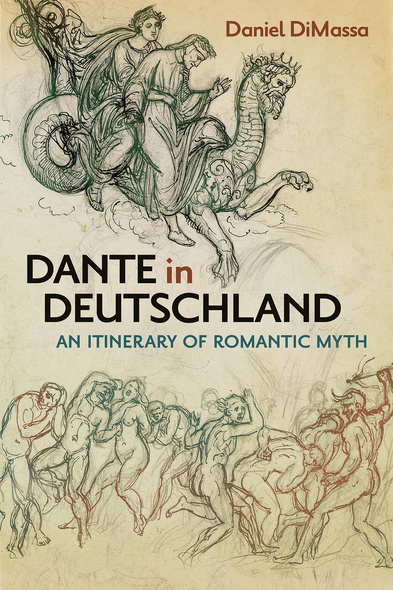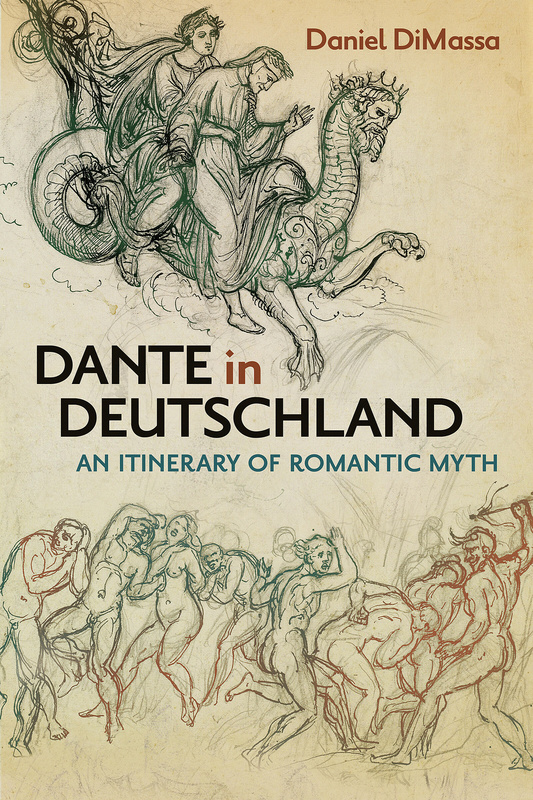
242 pages, 6 x 9
6 b&w images
Paperback
Release Date:12 Aug 2022
ISBN:9781684484188
Hardcover
Release Date:12 Aug 2022
ISBN:9781684484195
Dante in Deutschland
An Itinerary of Romantic Myth
SERIES:
New Studies in the Age of Goethe
Bucknell University Press
Around the turn of the nineteenth century, no task seemed more urgent to German Romantics than the creation of a new mythology. It would unite modern poets and grant them common ground, and bring philosophers and the Volk closer together. But what would a new mythology look like? Only one model sufficed, according to Friedrich Schlegel: Dante’s Divine Comedy. Through reading and juxtaposing canonical and obscure texts, Dante in Deutschland shows how Dante’s work shaped the development of German Romanticism; it argues, all the while, that the weight of Dante’s influence induced a Romantic preoccupation with authority: Who was authorized to create a mythology? This question—traced across texts by Schelling, Novalis, and Goethe—begets a Neo-Romantic fixation with Dantean authority in the mythic ventures of Gerhart Hauptmann, Rudolf Borchardt, and Stefan George. Only in Thomas Mann’s novels, DiMassa asserts, is the Romantics’ Dantean project ultimately demythologized.
Daniel DiMassa’s masterful book traces the fate of Dante in Germany, but in doing so tells a story of Romanticism and its many afterlives in Germany. From the Brothers Schlegel to the circle around Stefan George, DiMassa traces nothing less than the persistence of myth in German letters.
DiMassa’s erudite, intelligent, and elegantly written book offers an excellent overview of Dante’s reception in Germany in the context of Romanticism around 1800 and Neo-Romanticism in the early 20th century. He is not only very familiar with both German poetry and German literary criticism of the time; he also knows Dante’s text well.
The German Romantics made Dante the ideal of modern poets. He became a mythical authority, with an absolute claim to the roles of truth-teller and guide. Dante in Deutschland traces this dream from its creative power to its megalomaniac tendency—a unique case of one name becoming the measure of all things.’
It is still widely assumed that The Divine Comedy, given Goethe’s distaste for Dante, played little part in forming German modernity, and in shaping myths of a German return to medieval national and imperial glory. By leading us from a 1799 Jena reading circle to Stefan George and Thomas Mann, DiMassa fills in missing tranches of literary history to revise this potent, and ultimately tragic, narrative. Warmly recommended.
An illuminating lens through which to reread the multi-faceted, discursive formation known as ‘German Romanticism.’ DiMassa shows how Dante, unlike Shakespeare and Cervantes, was not only rediscovered by the Early Romantics but crucially informed their understanding of modern literary authorship as a visionary task of myth-making. In a range of cases starting with Schelling, Novalis, and Goethe, DiMassa traces the spirit of Dante to the birth of the modern (German) literary author.’
DiMassa has brought together the long and complex history of Dante’s fascination for German writers in a lucid and stylish study. It is exhaustive in the documentation of every phase—Romanticism, the age of Goethe, on down to the political uncertainties and initiatives that followed World War I. Dante is shown to have been central to the quest for literary authority, the search for a new mythology, the potential of allegory, the need for a model of autobiographical self-presentation. It emerges convincingly that there is more Dante in the deep history of German culture than might have been expected.
The large conceptions are supported by a fine grasp of the labyrinthine thinking of the Romantics and by close reading of key texts—Novalis’s ‘Hymnen an die Nacht’, Goethe’s ‘Ilmenau’, Schelling’s rarely analyzed poetry. Complexity nowhere generates obscurity. DiMassa’s text remains unpretentious and readable. He has drawn to good effect on his intimacy with two cultures.’
Daniel DiMassa’s masterful book traces the fate of Dante in Germany, but in doing so tells a story of Romanticism and its many afterlives in Germany. From the Brothers Schlegel to the circle around Stefan George, DiMassa traces nothing less than the persistence of myth in German letters.
DiMassa’s erudite, intelligent, and elegantly written book offers an excellent overview of Dante’s reception in Germany in the context of Romanticism around 1800 and Neo-Romanticism in the early 20th century. He is not only very familiar with both German poetry and German literary criticism of the time; he also knows Dante’s text well.
The German Romantics made Dante the ideal of modern poets. He became a mythical authority, with an absolute claim to the roles of truth-teller and guide. Dante in Deutschland traces this dream from its creative power to its megalomaniac tendency—a unique case of one name becoming the measure of all things.’
It is still widely assumed that The Divine Comedy, given Goethe’s distaste for Dante, played little part in forming German modernity, and in shaping myths of a German return to medieval national and imperial glory. By leading us from a 1799 Jena reading circle to Stefan George and Thomas Mann, DiMassa fills in missing tranches of literary history to revise this potent, and ultimately tragic, narrative. Warmly recommended.
An illuminating lens through which to reread the multi-faceted, discursive formation known as ‘German Romanticism.’ DiMassa shows how Dante, unlike Shakespeare and Cervantes, was not only rediscovered by the Early Romantics but crucially informed their understanding of modern literary authorship as a visionary task of myth-making. In a range of cases starting with Schelling, Novalis, and Goethe, DiMassa traces the spirit of Dante to the birth of the modern (German) literary author.’
DiMassa has brought together the long and complex history of Dante’s fascination for German writers in a lucid and stylish study. It is exhaustive in the documentation of every phase—Romanticism, the age of Goethe, on down to the political uncertainties and initiatives that followed World War I. Dante is shown to have been central to the quest for literary authority, the search for a new mythology, the potential of allegory, the need for a model of autobiographical self-presentation. It emerges convincingly that there is more Dante in the deep history of German culture than might have been expected.
The large conceptions are supported by a fine grasp of the labyrinthine thinking of the Romantics and by close reading of key texts—Novalis’s ‘Hymnen an die Nacht’, Goethe’s ‘Ilmenau’, Schelling’s rarely analyzed poetry. Complexity nowhere generates obscurity. DiMassa’s text remains unpretentious and readable. He has drawn to good effect on his intimacy with two cultures.’
Dante in Deutschland is one of those rare scholarly books that is both game-changing and thoroughly embedded within existing scholarship—well conceived, beautifully written, solidly documented and argued, and, most importantly, connecting traditional German studies of poetics and philosophy with significant new impetuses in cultural studies.
[A] model of Comparative Literature research. . . . Scholars of European literature, reception theorists, German history and literature scholars, political theorists, and Dante scholars will all find this book stimulating, informative, and concisely written. . . . Bucknell University Press deserves accolades for an excellently edited book that is elegantly produced with illustrations to support a very erudite and stimulating study.
DANIEL DiMASSA is an assistant professor of German at Worcester Polytechnic Institute in Worcester, Massachusetts.
List of Figures
List of Abbreviations
A Note on Translation
Introduction: Orienting Romanticism
Part I: Romanticism
1. Discovering Dante and Theorizing Myth: The Schlegel Brothers and the Origins of the Romantic Project
2. Schelling, Novalis, and the Legitimation of a Dantean Mythology
3. Goethe’s Dantean Mythologies of the Self and of the World
Part II: Neo-Romanticism
4. Trespassing the Sign: The Mad Flight of Gerhart Hauptmann
5. Abolishing History: New Dantean Germanies in Rudolf Borchardt and Stefan George
6. Thomas Mann and the Demythologization of Dante
Conclusion
Acknowledgments
Notes
Bibliography
Index
List of Abbreviations
A Note on Translation
Introduction: Orienting Romanticism
Part I: Romanticism
1. Discovering Dante and Theorizing Myth: The Schlegel Brothers and the Origins of the Romantic Project
2. Schelling, Novalis, and the Legitimation of a Dantean Mythology
3. Goethe’s Dantean Mythologies of the Self and of the World
Part II: Neo-Romanticism
4. Trespassing the Sign: The Mad Flight of Gerhart Hauptmann
5. Abolishing History: New Dantean Germanies in Rudolf Borchardt and Stefan George
6. Thomas Mann and the Demythologization of Dante
Conclusion
Acknowledgments
Notes
Bibliography
Index




